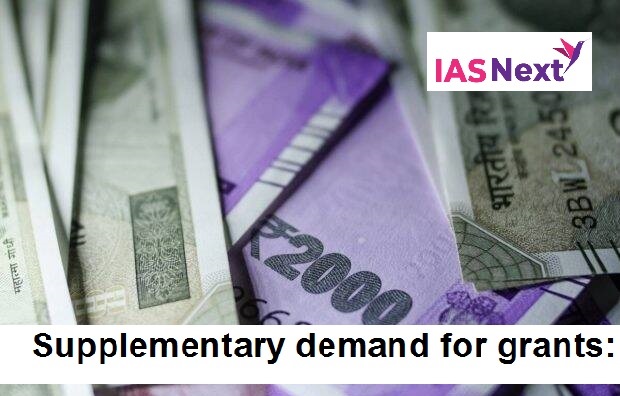CURRENT AFFAIRS
Get the most updated and recent current affair content on Padhaikaro.com
Supplementary demand for grants
- IAS NEXT, Lucknow
- 16, Mar 2022

Reference News:-
The government has sought approval from Parliament to spend an extra ₹1.07 lakh crore in the current fiscal year.
- The additional spending of Rs1.58 trillion is required for expenditure commitments towards settling loans taken from National Small Savings Funds for PM Awas Yojana and higher fertiliser subsidy outgo.
What are Supplementary Demands for Grants?
The supplementary demand for grants is needed for government expenditure over and above the amount for which Parliamentary approval was already obtained during the Budget session.
Constitutional provisions:
Supplementary, additional or excess grants and Votes on account, votes of credit and exceptional grants are mentioned in the Constitution of India 1949.
- Article 115: Supplementary, additional or excess grants.
- Article 116: Votes on account, votes of credit and exceptional grants.
Procedure to be followed:
- When grants, authorised by the Parliament, fall short of the required expenditure, an estimate is presented before the Parliament for Supplementary or Additional grants.
- These grants are presented and passed by the Parliament before the end of the financial year.
- When actual expenditure incurred exceeds the approved grants of the Parliament, the Ministry of Finance presents a Demand for Excess Grant.
- The Comptroller and Auditor General of India bring such excesses to the notice of the Parliament.
- The Public Accounts Committee examines these excesses and gives recommendations to the Parliament.
- The Demand for Excess Grants is made after the actual expenditure is incurred and is presented to the Parliament after the end of the financial year in which the expenses were made.
Other grants:
- Additional Grant: It is granted when a need has arisen during the current financial year for supplementary or additional expenditure upon some new service not contemplated in the Budget for that year.
- Excess Grant: It is granted when money has been spent on any service during a financial year in excess of the amount granted for that year. The demands for excess grants are made after the expenditure has actually been incurred and after the financial year to which it relates, has expired.
- Exceptional Grants: It is granted for an exceptional purpose which forms no part of the current service of any financial year.
- Token Grant: It is granted when funds to meet proposed expenditure on a new service can be made available by re-appropriation, a demand for the grant of a token sum may be submitted to the vote of the House and, if the House assents to the demand, funds may be so made available.